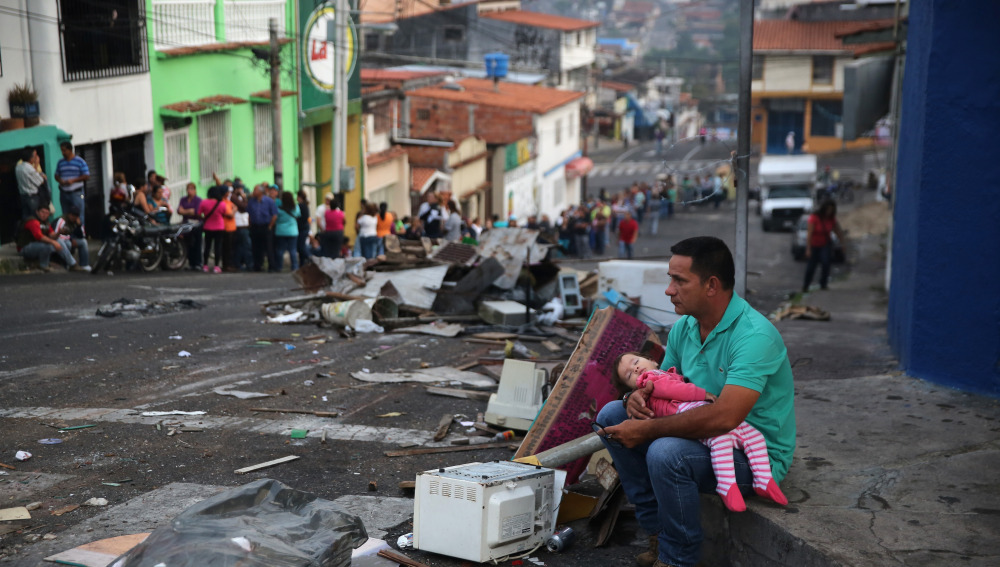The Chavez legacy: chaos in Venezuela

Unemployment, inflation, and high crime rates plaguing the South American country
In the streets of Venezuela, hundred-bolivar bills are treated like napkins, restaurant owners are missing toilet paper, the black market has become a hub for even the most basic of human necessities, and at the same time, the government is powerless while the country is undergoing the worst domestic crisis in recent memory. The successor to celebrated figure Hugo Chavez, President Nicolas Maduro, has been struggling with leftover economic policies and political challenges that threaten to devastate the country and spiral out of control.
ECONOMIC DOWNTURN
The crisis in Venezuela is mostly attributed to the economic policy decisions of the Chavez administration—especially the country’s over reliance on exporting oil, which accounts for over 95 per cent of export revenues. The government refused to raise the price of oil due to its abundance in the territory, which occurred simultaneously with the collapse of the oil market and Venezuela’s hard-hitting recession.
Chavez used the initial earnings from oil exports to finance many social services aimed at alleviating the burden on poor people, but the falling international oil prices meant that these programs have largely been cut, resulting in a lower standard of living and shortages of basic goods. Due to these shortages, many supermarket shelves remain empty, the government is strictly controlling supplies, and many Venezuelans are crossing the Colombian border to buy their everyday needs. Chavez’s government decided to provide subsidies for rice, sugar, medicine, toilet paper, and other commodities. These forms of public assistance helped compose the president’s populist message, but ultimately resulted in heavy state dependence.
The “Chavismo” economic policies, though initially meant to help the poor, translated into high inflation rates. The International Monetary Fund estimated that in 2017 the inflation rate would reach over 1,600 per cent, the highest in the country’s history. It is important to note that many economists regard a “good” inflation rate to be between four and six per cent—placing Venezuela’s in the category of hyperinflation. The rising rates have rendered Venezuela’s national currency, the bolivar, almost worthless, in a scene reminiscent of postwar Germany.
POLITICAL OPPOSITON
Maduro is facing intense opposition across the country. In a report by Reuters in late 2016, a pollster named Datanalisis found that less than 20 per cent of the local population approve of the president, an all time low for the administration. The same poll found that more than 78 per cent of citizens disapproved of the president. In contrast, former President Hugo Chavez’s approval ratings never fell below 50 per cent.
The opposition are making intense efforts to remove the president from power. In mid-2016, opposition leaders kick-started the process by beginning recall procedures. Under the Venezuelan constitution, the recall of a president can only be initiated once they have served half of their term in office. There are three steps: The opposition must collect the signatures of one per cent of voters in each of the 24 states. Once completed, they have three days to collect the signatures of 20 per cent of voters in each state. This would then trigger a recall referendum. In order to successfully remove the president from office, the opposition must receive more votes for his recall than the votes Maduro received when elected.
So far, recall proponents have completed the first stage. They were scheduled to begin the second step, but government officials stopped the movement upon hearing allegations of fraud in the collection of signatures. As of early 2017 the recall vote is suspended and Venezuelans across the country are protesting against the administration.
In late March, the Supreme Court, dominated by pro-administration appointees, voted to remove legislative power from the country’s National Assembly, a move many are calling a coup. Now, members of the tribunal have the authority to write laws themselves.
SOCIALIST EXISTENTIAL CRISIS
The free-fall of Venezuela down the rabbit hole has made many people question the country’s Socialist governance. Jeff Jacoby, in a column published by the Boston Globe on December 25, 2016, argued, “Socialism invariably kills and impoverishes. Gushing oil revenues amid a global energy boom could temporarily disguise the corrosion caused by a government takeover of market functions. But only temporarily. The Chavez/Maduro ‘Bolivarian revolution’ has been economic poison, just like every other Marxist “revolution” from Lenin’s Russia to Kim Il Sung’s North Korea to the Castros’ Cuba. By shredding property rights, dictating prices, and trying to control supply and demand, socialist regimes eventually make everything worse and virtually everyone poorer. Conversely, when governments protect free markets and allow buyers and sellers to interact freely, prosperity expands.”
Several pieces of both Chavez and Maduro‘s public policies contributed to the free-fall. Chavez refused to raise the prices of oil, subsidized enough products to create state dependence, and pushed the economy over the edge of hyperinflation. And Maduro’s refusal to leave office despite his failures has caused many to doubt the socialist policies of Venezuela.
Featured photo courtesy of the CBC
